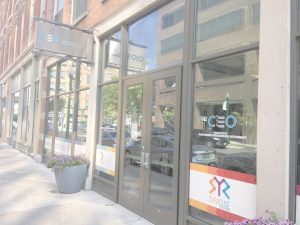DeWIT, N.Y. — NexGen Power Systems of California is liable for millions of dollars in “clawbacks,” if it doesn’t create the jobs it has promised, under a grant agreement approved Monday by New York State.
The Public Authorities Control Board voted unanimously to OK a $15 million grant for NexGen’s project at 50 Collamer Crossing Parkway in DeWitt, an 82,000-square-foot structure built with $90 million in taxpayer money to house a different California company.
The control-board vote had been delayed 10 days by Sen. John DeFrancisco (R–DeWitt) who demanded that Empire State Development (ESD) make clear the provisions for recovering taxpayer money if NexGen did not keep its promises. The provisions, commonly called clawbacks, were plainly laid out in the document that control-board representatives saw and voted on Monday.
(Sponsored)

Keeping Tabs on Employee Internet Use Could Create Employer Liability
Question: As a private sector employer trying to police our employees’ unauthorized use and/or abuse of our internet system, are we in danger of violating any privacy laws? Answer: If

The Pay Transparency Laws Become Effective On September 17th. Are You Ready?
Later this month New York will join a handful of States in the US which require greater transparency in wages. In December 2022, the Governor signed into law new wage
According to the documents, NexGen must create 10 jobs in 2018, or repay $2.5 million. Next year the number of jobs must reach 30, or the company will be liable for giving back $2.5 million. The jobs numbers rise year by year, and the liability continues at $2.5 million a year, until 2024 when NexGen must have created 290 jobs or repay $2.5 million.
However, under the agreement, NexGen gets a two-year grace period in any year it fails to meet the targets. “If at the end of the two-year “grace period,” grantee has still not met the relevant job commitment then ESD will collect the recapture amount plus interest,” the project documents said.
NexGen is set to make components for power systems utilizing proprietary technology. NexGen holds multiple patents and creates gallium-nitride semiconductor devices. The company says its products allow for the building of smaller and more efficient power converters. Such converters are part of most electronics.
The $15 million ESD grant will help NexGen buy the equipment needed for production.
Another part of the agreement gives the state a measure of ownership in the equipment. NexGen will use the state money to buy the equipment and then give title for the equipment to Fort Schuyler Management Corporation, a nonprofit connected to SUNY Polytechnic Institute.
The building NexGen is set to move into was built by New York State to house Soraa, a California company that makes LED lights. Soraa walked away from the project without having to pay any clawbacks.
The failure to recover money in that case, and the involvement by NexGen’s CEO in an earlier project that did not come to fruition in the Rochester area, were two reasons cited by DeFrancisco when he explained blocking the control-board vote earlier this month.
“I would love to see the project completed,” DeFrancisco, No. 2 in the Republican-led Senate, told BJNN at that time.
DeFrancisco, who is running for governor, says he was OK with the provisions and penalties outlined Monday, though he thought they could be tougher.
However, he notes that what was most important was that the control-board members got to see what they were voting on instead of blindly trusting ESD. “It’s not the greatest security, but at least it’s transparent,” DeFrancisco tells BJNN.
The state senator has filed a bill in the New York Senate that would require clawback provisions be made public in the future. “Hopefully, this is a model going forward,” DeFrancisco says.
In addition to the state assistance, the Onondaga County Industrial Development Agency (OCIDA) on Feb. 9 approved a $3.1 million payment in lieu of taxes agreement with NexGen. OCIDA also approved a sales-tax exemption on materials the firm buys to improve the facility, saving NexGen up to $40,000. OCIDA Executive Director Julie Cerio said at the time that there were clawbacks in the PILOT agreement. “We have clawbacks on everything,” she noted.
Contact McChesney at cmcchesney@cnybj.com




